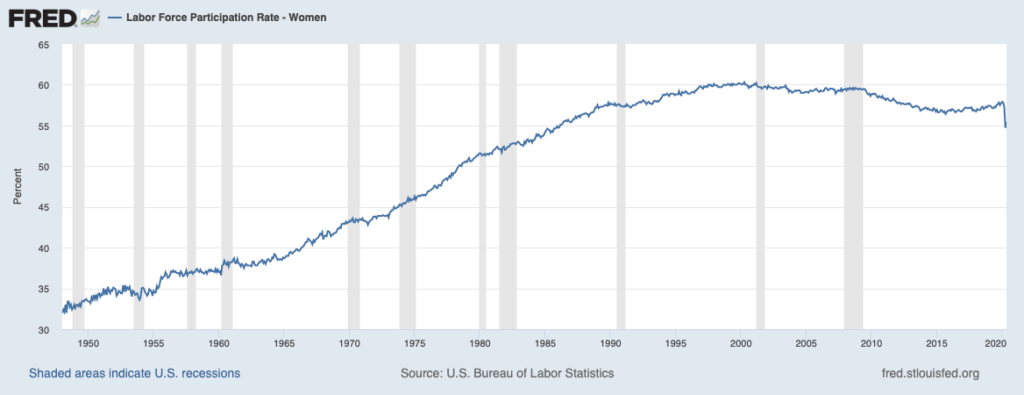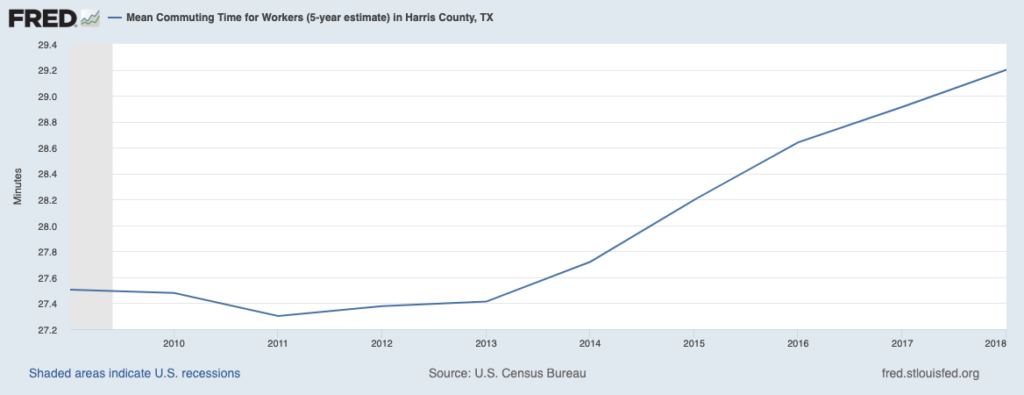World War II was a transformative event for our nation in many different ways. Some of the societal norms that existed before the war never returned. The national transition from a rural to an urban society was accelerated. The GI Bill was a huge impetus for an increasingly educated workforce. Perhaps most dramatically, large numbers of women took jobs at factories to fill the absence of men who were serving abroad in the military.
This dramatic move in female employment was personified in the ad campaign of Rosie the Riveter. Rosie became symbolic for the massive influx of women into the workplace. World War II transformed workplace demographics permanently. The graph below illustrates the change by looking at the labor force participation rate of women since 1948.

Will Rosie the Riveter become Rosie the Telecommuter?
Our national policy in fighting COVID may cause a transformative change in the workplace similar to the one we experienced during World War II.
As people work from home, they are discovering they enjoy the absence of a commute and the savings associated with a home office. These workers are saving money on gas, meals and dry cleaning. In fact, according to Axios, workers tend to save $7,000 per year in commuting, child care and wardrobe cost.
In addition, commuting times have dramatically increased over the last ten years. Case in point: the mean commuting time for Harris County provided by the St. Louis Federal Reserve. Not having to commute is an enticing benefit.

In regards to productivity, we do not have clarity yet on telecommuting costs vs. benefits. We have all sat through teleconferences where the host gives the upfront disclaimers of children at home, lawn service workers, etc. Working from home definitely has challenges.
There are added distractions including the refrigerator. However, endless office meetings have also disappeared as companies continue to enforce stay at home orders. From an employer standpoint, the mundane aspects of productivity can be monitored via software. However, creativity and workforce cohesion is more difficult and nuanced.
A number of employers have decided to take the plunge and become telecommuting companies. Nationwide Insurance announced on April 29th that they would close a number of their facilities and allow employees to permanently work from home. Twitter CEO Jack Dorsey made a similar announcement last month.
Employers are not being totally charitable. In the Axios paper cited earlier firms stand to save $11,000 per worker in office space. If individual companies can illustrate success in the transition from being a location-based company to a virtual company, more firms may follow suit. This would have a transformative effect on the economy. From the individual workers’ standpoint, there would be a reduction in fuel, clothing bills, meals, etc. This would create a ripple effect in a number of industries such as commercial real estate, restaurants, travel and apparel.
In addition, there would be a realignment in sales tax revenue in urban areas. If workers are no longer commuting, they are not spending money in the county of their employer. Those taxes would instead flow to the county of their residence. This could cause a major upheaval in county governments’ finances.
A potential positive might be discovered by employers who under normal circumstances would be limited to hiring from the local workforce pool. Additionally, real estate costs might shift as employees consider a move to the country or relocate closer to family.
I wouldn’t donate those suits to your local charity just yet. Companies have been known to change their minds. One only has to recall the about face by Marissa Mayer, former CEO of Yahoo, who banned working from home in 2013 due to productivity and creativity concerns. This created a lot of anger within the existing workforce. Changes in policy carry an inherent risk.
It will be interesting to see how companies’ work policies evolve as life returns to normal. Rosie may change the landscape of work again after all these years.

